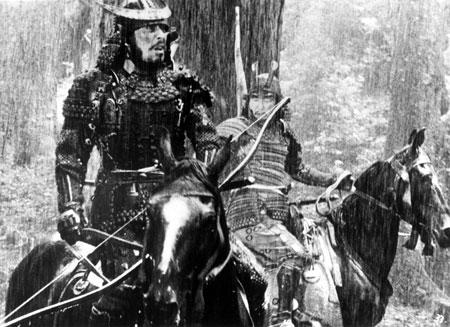
Kurosawa's cinema may seem to be about heroic action, but heroes, in the end, are merely human.
One of my most vivid cinematic memories involves a stocky little Asian man and a suited-booted white man frantically cutting wild grass, while the sun threatens to set behind them. I was six or seven, and understood nothing of the film. But the elemental power of that single scene never left me: the vast, bleak grassland, the eerie light, the wind beginning to howl, and the knowledge – somehow contained wordlessly in the furious cutting of the grass – that life depended on it.
Fifteen years later, I learnt that the film was called Dersu Uzala (1975), which was also the name of its memorable protagonist: an old Goldi hunter who knows the cold forests of the Russian Far East like the back of his hand, but loses his eyesight and is forced to go live in a town. Its world-renowned Japanese director, Akira Kurosawa, had been offered the project by the Soviet studio Mosfilm in 1973. It was a time of great tumult in Kurosawa’s life: his attempt to break into Hollywood with Tora Tora Tora had gone horribly wrong, his experimental venture Dodesukaden (1970) had received a lukewarm reception in Japan and he was unable to get funding. In Dersu’s profound bewilderment – that he, who was so attuned to the wilderness, can no longer survive in it – one senses an echo of Kurosawa’s own feelings about cinema in those years.
 Kurosawa was deeply concerned about human hubris. He once said, “People today have forgotten they’re really just a part of nature. Yet, they destroy the nature on which our lives depend. They always think they can make something better...” There is something magical about his rendition of the landscape in Dersu; the wind, the rain, the sun seem almost to conspire to make the two men lose their way. Then you watch the two warriors befuddled by the forest in Throne of Blood (1957), and you realize that Kurosawa has thought of nature in this way for a long, long time. Transposing Macbeth to medieval Japan, he takes the Birnam Wood of the prophecy (“I shall not be afraid of death or bane, till Birnam Wood come to Dunsinane”) and makes of it an eerie presence more powerful than the strongest warrior: the Cobweb Forest. Even in Seven Samurai, the heroism of the samurai is ephemeral – it is the land and the peasant’s link to it that is forever. Kurosawa was known for his larger-than-life dramas. But what makes his cinema truly epic is the profound sense that there is something larger than the heroic human life.
Kurosawa was deeply concerned about human hubris. He once said, “People today have forgotten they’re really just a part of nature. Yet, they destroy the nature on which our lives depend. They always think they can make something better...” There is something magical about his rendition of the landscape in Dersu; the wind, the rain, the sun seem almost to conspire to make the two men lose their way. Then you watch the two warriors befuddled by the forest in Throne of Blood (1957), and you realize that Kurosawa has thought of nature in this way for a long, long time. Transposing Macbeth to medieval Japan, he takes the Birnam Wood of the prophecy (“I shall not be afraid of death or bane, till Birnam Wood come to Dunsinane”) and makes of it an eerie presence more powerful than the strongest warrior: the Cobweb Forest. Even in Seven Samurai, the heroism of the samurai is ephemeral – it is the land and the peasant’s link to it that is forever. Kurosawa was known for his larger-than-life dramas. But what makes his cinema truly epic is the profound sense that there is something larger than the heroic human life. Published in UTV World Movies magazine, Dec 2010.
No comments:
Post a Comment